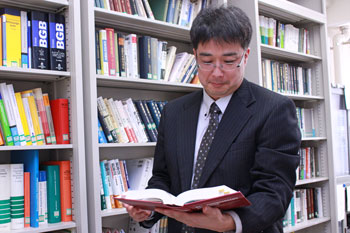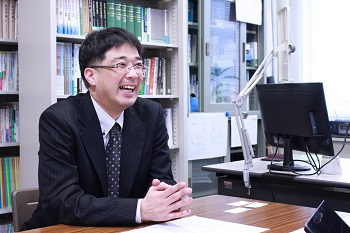Reisei Jinno. Medical practices and family's consent (Retirement Commemorative issue of Professor Yoshiaki Kohari). Hiroshima Law Review. 12, 2016, p.223-245. (Japanese)
In a rapid-aging society, we will be required to decide whether or not to receive medical treatments for life prolongation. This decision also includes the standard of medical treatment received. Currently, for a patient who has no ability to make those decisions, medical practices are chosen at the discretion of a doctor or a family member. This raises the question: If a patient is very old and has no family, or a patient’s family is struggling with expenses for treatments and nursing labor, does such a decision fully comply with the patient’s wishes? With reference to German law, Professor Jinno examines possible roles of an adult guardian for making medical decisions on behalf of a patient who has lost their capacity for sound judgment.

Reisei Jinno
Hiroshima University Law School, Professor
When conducting surgery or similar medical practices, physicians must obtain consent from their patients (i.e., informed consent). This is because patients have the right to decide for themselves whether or not to receive medical treatment. However, when a patient is no longer able to understand the nature of the operation for reasons such as dementia, from who should a physician obtain consent? At present, there is no law that makes any clear stipulation about this matter. The fact is that medical interventions in such cases are carried out according to the doctor's discretion and the family's judgment. However, in such situations, a variety of obstacles also arise at the sites of medical practice. In the case of elderly people with no relatives, the physician’s inability to obtain an individual’s consent means that he or she cannot proactively perform the necessary treatment. Moreover, even when there are family members, it is also true that families do not always make decisions out of consideration for the patient’s welfare. Family members may have a conflict of interest with the patient. For example, the burden of expenses for treatment and nursing labor. It appears that simply having a family relationship is not necessarily sufficient grounds for being considered someone suitable as a guarantor of consent.

Therefore, a debate is ongoing as to whether adult guardians should be able to make medical decisions on behalf of persons who have lost the capacity for judgement. Adult guardians are persons authorized to protect adults with insufficient judgment ability because of issues such as intellectual/mental disability or dementia following old age. Someone suitable to act as an adult guardian will be appointed by a family court. Currently, third parties other than family members such as lawyers and judicial scriveners are appointed in 70% of the cases, whereas the appointment of family members such as spouses, children, or siblings accounts for the remaining 30%. Even so, because there is a possibility that a medical decision may seriously affect the life and/or the body of the affected patient, if the right of determination were to be given to an adult guardian, it would become necessary to take measures to prevent the abuse of this right, such as by requesting permission from a family court for serious medical actions. In this paper, I examine this problem while drawing on references from German law.



 Home
Home